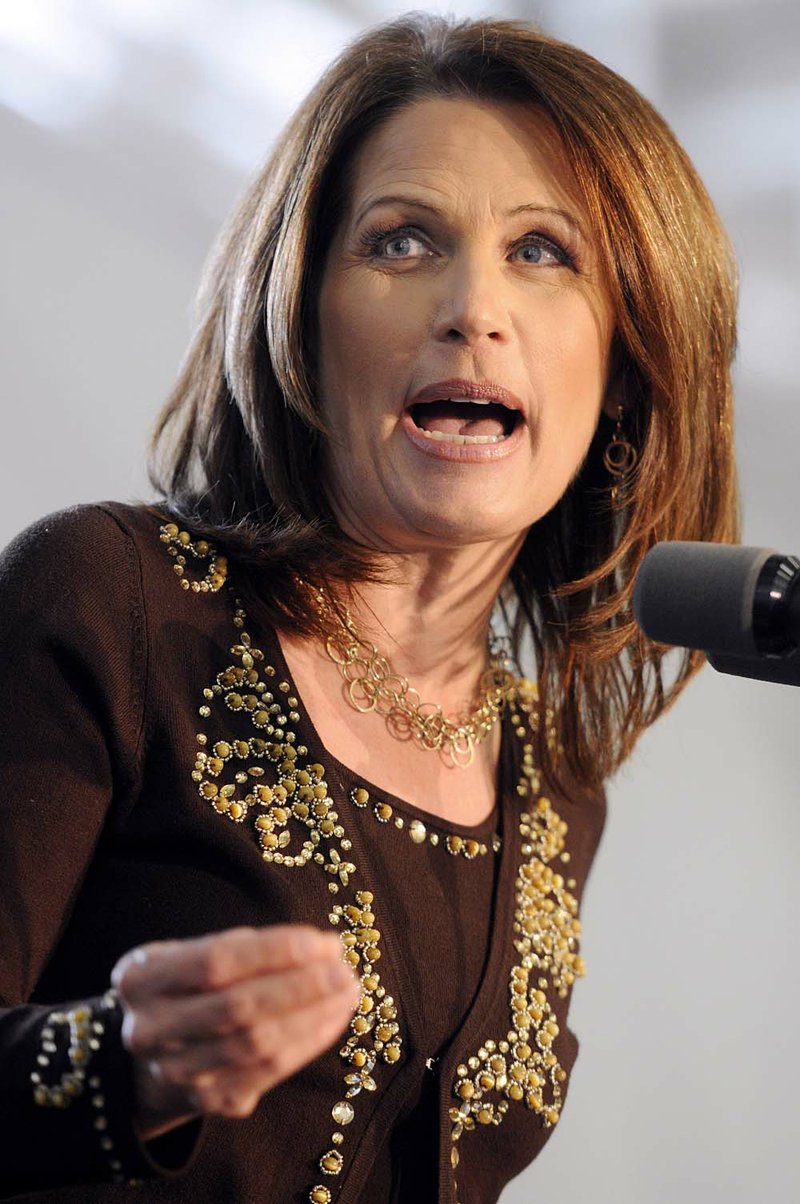WASHINGTON — Even from thousands of miles away, through a computer screen, over Skype, and into a packed room in Fresno, Calif., Rep. Michele Bachmann knows how to ignite a crowd.
Leading up to the health care vote this year, Bachmann, R-Minn., would head to a conference room in the National Republican Campaign Committee’s headquarters and hold Skype rallies, using the Internet video service to address audiences around the country. Staff members walking by could hear the cheering crowds, roaring so loud they reverberated through the glass wall and out into the committee’s hallway.
Now, with Republicans poised to retake the House in the new Congress, lawmakers are watching Bachmann - a driving force on cable television - to see if she can harness her status as a spokesman for conservative principles and turn it into real legislative influence.
This month, Bachmann ran for her party’s No. 4 position in the House as a self styled leader of the Tea Party movement, only to withdraw when it became clear she was attracting little support, even as her willingness to promote an unfounded report that President Barack Obama’s trip to India would cost taxpayers $200 million a day kept her front and center in the cable-politics mosh pit.
Bachmann, first elected in 2006, said she was eager to work with her party - “I’ve heard nothing from the leaders other than espousing the principles of the Tea Party and their fervent commitment to stand by those ideals,” Bachmann said - but she is also willing to shake things up, and is working to organize Tea Party-affiliated Republicans into a voting bloc in the House.
“I think the Republican leaders have gotten the message, and if they haven’t, I have not been afraid to be vocal in the past and I won’t be afraid to be vocal going forward,” Bachmann said in a telephone interview. She mentioned her opposition to President George W. Bush’s $700 billion Wall Street bailout in 2008, and explained,“I’ve been willing to take on my own party, my own leadership, my own president before, so I would be willing to do that again, if I felt there’s a principled reason to do so.”
Bachmann said that the day after the election, she “woke up to members of Congress calling me and urging me to run for” the leadership position, but she “found out fairly quickly I was not the leadership pick.”
Senior House Republican staff members said that while the party’s leaders were eager to have a woman and a Tea Party member in their upper ranks, they were concerned about Bachmann’s high rate of staff turnover - she has burned through all of her top aides at least once - and were not sure she would be willing to deliver the party’s message rather than her own.They were also concerned about her faux pas, like the claim about the expense of Obama’s Asia trip or the time on MSNBC’s Hardball when she suggested that Obama might have “anti-American views.” Both of those statements put fellow Republicans in the position of having to either defend her or distance themselves from one of their own.
“Michele Bachmann does not have a strong record as a legislative strategist, and that’s never been her forte,” said Lawrence Jacobs, a political science professor at the University of Minnesota.
“She says things that are kind of off the wall, but these are often calculated statements on her part, to register with conservative, grass-roots people, and that’s very hard for folks who are not grass-roots conservatives to understand,” Jacobs said. “Some of the things she says are zany and embarrassing to other Republicans, but that’s part of what has given her this authenticity.”
Bachmann’s credibility with the Tea Party movement may be her biggest asset.
“This is no disrespect intended to anyone on the inside of the leadership, but with Michele Bachmann, it’s like having our person on the inside,” said Tim Phillips, president of Americans for Prosperity, a conservative advocacy group. “We know she’s movement first, not party first, and we have complete confidence that when she speaks, she has our interests and the movement’s interests at heart.”
The Congressional Tea Party Caucus, which Bachmann started in July, has 53 members and is expected to increase as conservative freshmen descend on the Capitol, giving it the potential to be a crucial voting bloc. Jacobs said that Bachmann was establishing “the presence of the Tea Party Caucus as a kingmaker,” and that if she used it strategically and carefully chose a few key battles, “they can be as powerful and maybe more powerful than the Blue Dogs,” the now-depleted group of moderate and conservative Democrats who served as a counterweight to their party’s liberal wing.
When asked if the Tea Party Caucus could be a spoiler or a rainmaker for certain Republican legislation, Bachmann replied, “It could be.”
“Our focus will be on continually educating our members and practicing our craft to understand the role and the ideals of the Tea Party,” she said. “But certainly if we see leadership come forward with a bill that we believe is in opposition to Tea Party ideals, that is one vehicle where we could band together.”
For now, her plan for the caucus “is to start weekly classes on the Declaration of Independence, the Constitution and the Bill of Rights,” inviting everyone from Supreme Court justices to legal scholars to speak.
“As we’re studying every week, let’s say for instance the commerce clause, then as the legislation comes before us, we can apply through the grid of the Constitution the actual legislation that we’re looking at,” she said.
“This is a tremendous real-time forum to be able to discuss these issues ahead of time, prior to the vote, in regard to principles of the Tea Party.”
Front Section, Pages 9 on 11/21/2010
